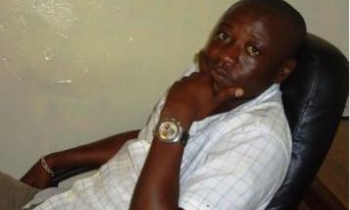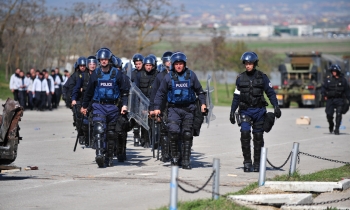Two pominent reformist newspapers in Iran that had been banned resumed publishing this week.
One of the papers, Hammihan (Compatriot), was banned in 2000 by the hardline judiciary after it called for improved ties with the United States, the Associated Press (AP) reported. On Sunday, the paper was back on the newsstands, and its top story — with the headline "Iran-US talks in Baghdad" — was on an agreement announced by the two countries over the weekend to hold ambassador-level talks on the situation in war-torn neighboring Iraq.
The other paper, Shargh (East), which had been banned last year after it poked
fun at Ahmadinejad in a cartoon, resumed publishing on Monday.

The decision to allow the papers to reopen appeared to reflect a feeling among Iran's unelected clerical leadership that it must allow a margin of expression for the opposition amid mounting discontent with Ahmadinejad at home.
The clerical leadership controls the judiciary and backed Ahmadinejad in his 2005 election victory that brought him to power. However, conservatives who once supported the president have joined his critics, saying he has ignored mounting economic woes and has needlessly provoked the West against Iran in disputes over its nuclear programme.
"Given the ... threats against Iran, the ruling establishment has decided that opposing voices need to be heard, although Ahmadinejad's government may not like it," Mahdi Rahmanian, editor of Shargh, told AP.
"Since Shargh wants to work within the framework of the Islamic Republic of Iran’s media policies, we will adhere to respecting people’s privacy," wrote Mehdi Rahmanian in an editorial. "We will respect the national interest and the regime’s regulations and we will make sure not to cross the red lines," he wrote.
After a series of warnings, the paper was shut down last year for printing a cartoon depicting a donkey, its head surrounded by an aura, facing a knight on a chess board. The cartoon was deemed insulting to the president who said he had felt surrounded by an aura of light during his speech to the UN General Assembly in 2005. Shargh journalists denied the charge.
The first edition of the new Shargh carried a lively range of international and cultural news, including an article on US-Iranian relations and an interview with US film director Gus van Sant.
The move to lift the bans restores some degree of opposition voice at a time when Ahmadinejad's government has stepped up a crackdown on some critics, particularly pro-democracy advocates, fearing they may be part of US moves to foment regime change.

Last week, authorities arrested a prominent Iranian-American academic, Haleh Esfandiari, and a hardline newspaper accused her of spying for the United States and Israel and trying to start a revolution inside Iran. Her family has denied the accusations.
The Iranian leadership is under multiple pressures — trying to avert further UN sanctions over its nuclear programme even as the US has taken a more aggressive stance against what it calls Iranian meddling in Iraq. Washington accuses Tehran of backing militants there, a charge Iran denies.
At the same time, Ahmadinejad's political rivals have been gaining ground. Local elections in December brought an embarassing defeat for his hardline supporters as reformists and conservatives opposed to the president won dominance in many city councils across the country.
Last week, the Tehran city council reelected an Ahmadinejad rival, moderate conservative Mohammad Bagher Qalibaf, as mayor of the capital, strengthening his position to run against Ahmadinejhad for the presidency.
Conservatives and reformists have complained about Iran's worsening economy, with housing prices doubling and prices for goods such as vegetables tripling in the past six months. The government is planning to increase the price of gas and impose rationing, a decision that has caused great concern for the public.
The clerical leadership may be hoping that the return of some reformist newspapers will provide a safety valve for the discontent. The judiciary closed down more than 100 reformist papers during the last years of the rule of Ahmadinejad's predecessor, pro-reform President Mohammad Khatami — part of the struggle for power between reformists and hardliners.

"We remain committed to our reformist goals. There is only one hope that directs us in continuing this path: Trying to offer a clearer support for freedoms," said one of Hammihan's editors, Mohammad Ghouchani.
The new Hammihan is staffed by a team of veteran journalists from reformist newspapers, but it also seeks to appeal to a wider range of readers with a daily supplement featuring lifestyle pieces and softer news. Hammihan's chief manager is Gholamhossein Karbaschi, a former Tehran mayor and Khatami ally who was jailed in 1999 on graft charges that were seen to be politically motivated.
Khatami congratulated Hammihan on its rebirth, calling it a "dignified" newspaper. "Thank God that as far as possible we promoted free flow of information and respected journalists ... although the press paid a high price for it," he said in a message to Hammihan.
Iran ranks as Not Free in the 2007 edition of Freedom in the World, Freedom House's annual survey of political rights and civil liberties. The country received a rating of 6 (on a scale of 1 to 7, with 7 as the lowest) for political rights and a 6 for civil liberties, and was given a downward trend arrow in 2007.
Freedom of the Press 2007, an annual survey of press freedom around the world, gave Iran one of the lowest scores worldwide. The survey reported that press freedom in Iran continued its decline in 2006 as the regime's conservative leaders cracked down on reformist publications and journalists through intimidation, closures and arrests. The public has responded to the shrinking space for free expression by increasingly turning to the Internet, as well as satellite television and radio. The government reacted in 2006 by escalating its efforts to filter the Internet and register individual websites, and continuing its arrest of bloggers and other online activists.









